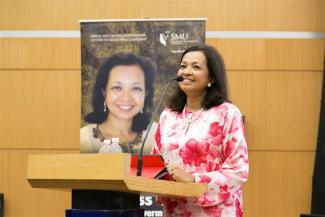Annual Wee Kim Wee Distinguished Lecture on Educational Leadership 2016 by Datin Paduka Marina Mahathir addressed gender empowerment issues

- Second Annual Wee Kim Wee Distinguished Lecture Series on Educational Leadership
- Gender empowerment and disempowerment in education
- Inequalities in education reflect and further breed inequalities in society
Inequalities in education reflect and further breed inequalities in society, said Datin Paduka Marina Mahathir, the well-known Malaysian activist and writer who has been advocating for women and human rights. She was speaking at the second Annual Wee Kim Wee Distinguished Lecture Series on Educational Leadership on 12 April 2016 that was organised by Singapore Management University’s (SMU) Wee Kim Wee Centre (WKWC).
Emphasising that it is not possible to succeed in developing a country without educating its female population, she firmly believes that democracy in schools can lead to democracy in society.
Speaking from rich experience, her lecture themed “Smart Girls, Smartass Boys: Gender Empowerment and Disempowerment in Education” focused on gender disparities in education and how they are linked with social inequalities.
Datin Paduka Mahathir spoke about the gaps related to gender stereotypes, the effects on societies, and where alignments could be made to advance gender and social equality, particularly through education.
In her address, she said that the World Bank stated that “girls’ education is a strategic development investment – evidence shows that countries with greater gender equality are more likely to have higher economic growth.” Further, the Bank added, there is a multiplier effect of educating girls that is far more significant than men because of the caregiving role most girls and women perform in society.
She cited the Bank, “More educated women tend to be healthier, participate more in the formal labour market, earn more income, have fewer children, and provide better health care and education to their children, all of which eventually improve the well-being of all individuals and can lift households out of poverty. These benefits also transmit across generations, as well as to communities at large.”
Reworking the stereotypes around gender, about men’s and women’s roles in the family and society, will ultimately benefit both institutions.
While it is laudable that many countries are lowering their illiteracy rates, there needs also to be much focus on keeping children in school as long as possible, she added.
The quality of education is also a valid area of concern, and in the world today, needs to be re-defined from one that simply emphasises academic quality, to one that looks at what makes a quality person and citizen. She called for youths to learn how to contribute to a society that is just to all its citizens regardless of their gender, race, religion or station in life.
She concluded her lecture with a quote from Nelson Mandela, “Education is the most powerful weapon which you can use to change the world.”

[Photo (left to right): Datin Paduka Mahathir engaged with guests in a dialogue after the lecture, moderated by WKWC Director Associate Professor Kirpal Singh.]
After the lecture, the question-and-answer session saw a stream of candid questions and comments from the audience, and Datin Paduka Mahathir engaging in an active dialogue with guests.

The event held at SMU’s Mochtar Riady Auditorium was attended by about 200 guests from multiple sectors.
In this series of lectures that pays tribute to the late Singapore President Dr Wee Kim Wee, key educators are invited to provide various scholarly perspectives on strategic issues concerning higher education and educational leadership. It aims to inspire and bring about sustainable and positive change while enabling attendees to develop a fuller understanding of the importance of effective leadership in the field of education.
The first five lectures of the annual series are generously supported by the Training Vision Institute (TVI).
[Featured Photo: Datin Paduka Marina Mahathir speaking at the second Annual Wee Kim Wee Distinguished Lecture Series on Educational Leadership at SMU on 12 April 2016.